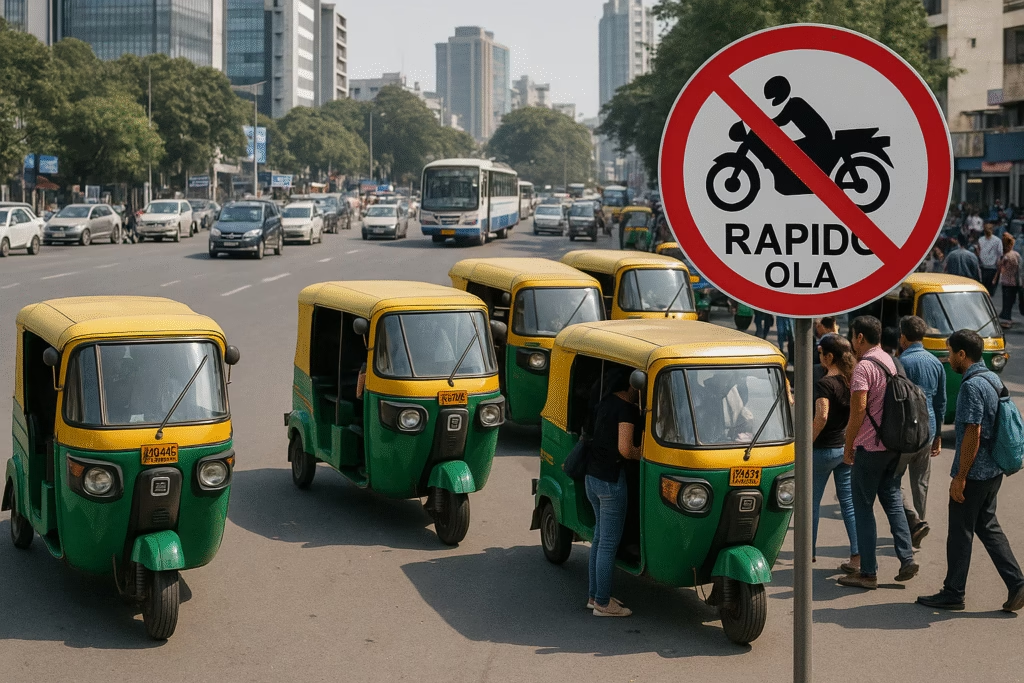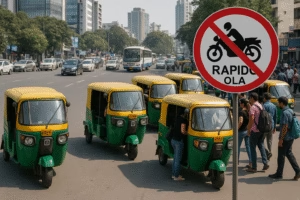
Bengaluru Bike Taxi Ban
Bengaluru Bike Taxi Ban: How Autos Are Dominating City Roads in 2025

The recent Bengaluru Bike Taxi Ban has stirred the city’s already chaotic traffic scene, pushing thousands of commuters back to traditional auto rickshaws. What does this mean for daily riders, auto drivers, and the future of mobility in India’s Silicon Valley?
What Triggered the Bengaluru Bike Taxi Ban?
Earlier this year, the Karnataka Transport Department enforced the Bengaluru Bike Taxi Ban citing unlicensed operations, safety hazards, and violation of commercial permit rules. Popular services like Rapido and Ola Bike were flagged for deploying personal two-wheelers for commercial rides without mandatory insurance or licenses, risking commuter safety.
This crackdown aligns with rules in many other Indian cities. To understand the broader context, you can read about why Karnataka took this step here.
Auto Rickshaws: The Unexpected Beneficiaries
Auto rickshaw unions long argued bike taxis undercut them by offering rides at unsustainably low prices. With the ban in force, these three-wheelers have regained dominance for short trips, especially in high-density areas like Indiranagar, Koramangala, and Majestic.
Ride-hailing apps show a surge in auto bookings by 40% since the Bengaluru Bike Taxi Ban. Drivers report longer queues at stands, more frequent ride requests, and increased daily earnings.
Impact on Commuters: Mixed Reactions
For many students and office-goers, the Bengaluru Bike Taxi Ban is a blow to pocket-friendly, swift commutes. While autos are reliable, they are more expensive and less nimble in peak-hour jams. This change has sparked frustration among daily riders.
“A quick ₹40 bike ride has turned into a ₹100 auto ride. Plus, I get stuck in traffic longer,” says Shruti, a student in Whitefield.
In response, companies like Ola and Uber have launched new discounts on auto rides to retain customers lost due to the Bengaluru Bike Taxi Ban. But critics argue these are temporary fixes and don’t address the larger urban mobility challenge.
Is There Hope for Bike Taxis to Return?
Urban mobility experts urge the Karnataka government to regulate, not ban, bike taxis. They argue clear rules, insurance mandates, and driver verification could legalise this eco-friendly option. Neighbouring Telangana and Maharashtra are examples where bike taxis operate within defined frameworks.
Industry insiders hint that startups and aggregator companies are lobbying for revised norms. According to Mint’s recent report, talks are ongoing but progress remains slow due to political pushback from powerful auto unions.
Commuter Tips Post-Bengaluru Bike Taxi Ban
Until things change, here are practical tips for navigating Bengaluru’s streets without bike taxis:
- Plan buffer time: Autos can get stuck in jams, so leave early.
- Book off-peak: Avoid rush hours to dodge surge pricing.
- Combine modes: Use Metro plus autos for smoother travel.
- Watch for updates: Follow TrendyIndiaNews.com for any policy shifts on the Bengaluru Bike Taxi Ban.
Final Thoughts: The Road Ahead
The Bengaluru Bike Taxi Ban is a classic case of regulation struggling to catch up with urban innovation. While autos rejoice today, the city’s traffic woes and commuter grievances demand a smarter, legalised solution for bike taxis.
For now, the humble auto rickshaw is king once again on Bengaluru’s potholed roads — but for how long? Only time and smart policy will tell.
Stay informed with more updates at TrendyIndiaNews.com.
About The Author
Discover more from Trendy India News
Subscribe to get the latest posts sent to your email.







2 thoughts on “Bengaluru Bike Taxi Ban: How Autos Are Dominating City Roads in 2025”